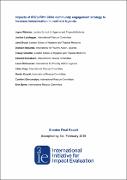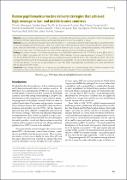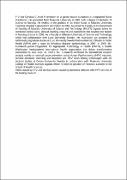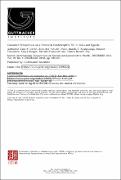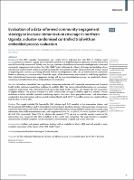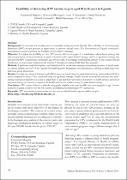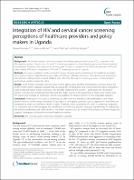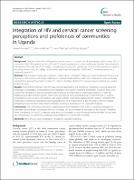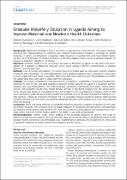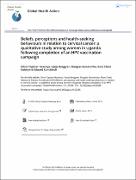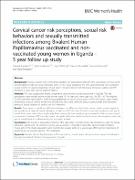Research Articles: Recent submissions
Now showing items 21-36 of 36
-
Impacts of IRC’s Fifth Child community engagement strategy to increase immunisation in northern Uganda
(2019)The 2011 Uganda Demographic and Health Survey (UDHS) reported that the national coverage of the third dose of the combined diphtheria, pertussis, tetanus vaccine (DPT3) among children 12-23 months of age was 73%, and only ... -
Immunogenicity of bivalent HPV vaccine among partially vaccinatedyoung adolescent girls in Uganda
(Elsevier Ltd., 2014)Background: Investigations of vaccine efficacy and immunogenicity for adult females receiving fewerthan three doses of human papillomavirus (HPV) vaccine have suggested protection against infection andprecancerous lesions. ... -
Human papillomavirus vaccine delivery strategies that achieved high coverage in low- and middle-income countries
(Bull World Health Organ, 2011)Objective To assess human papillomavirus (HPV) vaccination coverage after demonstration projects conducted in India, Peru, Uganda and Viet Nam by PATH and national governments and to explore the reasons for vaccine ... -
Human Immunodeficiency Virus (HIV), Human Papillomavirus (HPV) and Cervical Cancer Prevention in Uganda
(Örebro university, 2015)Background: HIV-positive women have an increased risk of developing cervical cancer (CC) compared to the HIV-negative women. Despite this, HIV and CC screening programs in many developing countries have remained disintegrated. ... -
Consumer Perspectives on a Pericoital Contraceptive Pill in India and Ugand
(2013)CONTEXT: Studies suggest that women in some countries have adopted emergency contraceptive pills as a routine method of family planning. This practice indicates there may be latent demand for a pericoital contraceptive ... -
Developing a Gap Analysis tool to improve Ebola vaccine acceptance and compliance in sub-Saharan Africa
(Humanitarian Policy Group, 2020) -
Evaluation of a data-informed community engagement strategy to increase immunisation coverage in northern Uganda: a cluster-randomised controlled trial with an embedded process evaluation
(The Lancet Global Health, 2018)Background The 2016 Ugandan Demographic and Health Survey indicated that only 86% of children (aged 12–23 months) in northern Uganda had received the third dose of diphtheria-tetanus-pertussis vaccine (DTP3) and only 65% ... -
Feasibility of delivering HPV vaccine to girls aged 10 to 15 years in Uganda
(African health sciences, 2015)Background: Cervical cancer is a leading cause of mortality among women in Uganda. The availability of the human papillomavirus (HPV) vaccine presents an opportunity to prevent cervical cancer. The Government of Uganda ... -
Integration of HIV and cervical cancer screening perceptions of healthcare providers and policy makers in Uganda
(BMC Public Health, 2014)Background: HIV-positive women have an increased risk of developing cervical cancer (CC) compared to the HIV-negative women. Despite this, HIV and CC screening programs in many developing countries have remained disintegrated. ... -
Open Access Integration of HIV and cervical cancer screening perceptions and preferences of communities in Uganda
(BMC women's health, 2015)Background: Despite the fact that HIV-positive women carry an increased risk of developing cervical cancer (CC) in comparison with HIV-negative women, HIV and CC screening programs in many developing countries have ... -
Graduate Midwifery Education in Uganda Aiming to Improve Maternal and Newborn Health Outcomes
(Annals of Global Health, 2020)Background: Maternal and newborn health outcomes in Uganda have remained poor. The major challenge affecting the implementation of maternal and newborn interventions includes a shortage of skilled midwives. In 2013, Lira ... -
Assessing the impact of cervical cancer integration into reproductive health networks: operations research from Uganda
(International Population Conference, 2017)The Cervical Cancer Screening and Preventive Therapy (CCS&PT) via Reproductive Health Networks initiative started in 2012, with the aim of improving health outcomes through the provision of services targeted at women at ... -
Beliefs, perceptions and health-seeking behaviours in relation to cervical cancer: a qualitative study among women in Uganda following completion of an HPV vaccination campaign
(Global Health Action, 2016)Background: Cervical cancer remains a leading cause of morbidity and mortality in Uganda. Despite earlier information campaigns to introduce human papilloma virus (HPV) vaccination, which also targeted cervical cancer, ... -
Cervical cancer risk perceptions, sexual risk behaviors and sexually transmitted infections among Bivalent Human Papillomavirus vaccinated and nonvaccinated young women in Uganda - 5 year follow up study
(BMC women's health, 2017)Background: Previous studies were conflicting regarding the associations between HPV vaccination, cervical cancer risk perceptions, high-risk sexual behaviors and STIs. This study compared the HPV-vaccinated and ... -
Peer-group support intervention improves the psychosocial well-being of AIDS orphans: Cluster randomized trial
(Elsevier, 2009)Accumulating evidence suggests that AIDS orphanhood status is accompanied by increased levels of psychological distress such as anxiety, depression, intense guilt, shame, and anger. However, few studies have examined the ...

